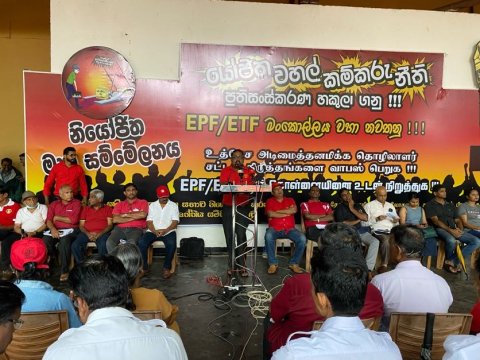
Photo: Convening of Sri Lankan trade unions in 2023 around shared
concerns on the labour law and pension fund reform (FTZ&GSEU).
Amnesty International, Human Rights Watch, and the Clean Clothes Campaign, of which MSN is a member, are urgently calling on the Sri Lankan government to halt the current proposals for a new labour law and ensure that future labour reforms are only proposed and adopted following proper consultation with workers and their representatives.
In an Open Letter to the Sri Lankan government, the three organizations express their serious concerns that the proposed reforms would weaken the rights and protections afforded to workers, particularly those working in the garment sector, by removing reference to internationally-recognized labour and human rights standards currently included in Sri Lankan law.
For close to a year, MSN’s labour partner, the Free Trade Zones and General Services Employees Union (FTZ&GSEU), and other unions and civil society organizations in Sri Lanka have been speaking out and protesting against the proposed reforms.
If passed, the proposed labour reform would remove protections against excessive overtime, allowing shifts of up to 16 hours with only one 1-hour break and no overtime pay. The proposed legislation would also remove protections against unfair dismissal for workers attempting to form a union, weakening workers’ right to freedom of association. Women workers would also lose protections in place for night shifts.
The process for drafting the labour reforms ignored established tripartite consultation mechanisms and bypassed existing democratic processes. Four unions were removed from the National Labour Advisory Council in May of 2023, and, to date, the proposed reforms have not been translated into two of the country’s three official languages, as required by law.
“Human Rights Watch joins other organizations urging the Sri Lankan government and members of parliament to halt the ongoing efforts to seriously weaken Sri Lanka’s labour protections,” said Aruna Kashyap, Associate Director in the Economic Justice and Rights Division for Human Rights Watch. “As domestic groups have warned repeatedly, pressing ahead in a non-transparent, non-consultative way would be disastrous for developing laws that better protect labour rights and improve Sri Lanka’s garment industry.”
Ineke Zeldenrust, International Coordinator at Clean Clothes Campaign said: “Clean Clothes Campaign follows its network members and partners in Sri Lanka in expressing deep concern about the proposed labour law changes in Sri Lanka, as well as the way that due process and workers voices have been ignored over the months that this proposal has been circulating… In this time of cost-of-living crisis, workers need protection by the law and the power of union organizing more than ever.”
MSN joins Sri Lankan labour partners and international allies in calling on the government to halt the current labour reforms and initiate a transparent and democratic process to create labour reforms that respect Sri Lankan workers’ rights and international labour standards.
For more information:
- Open Letter to the Government and Parliament of Sri Lanka on the Imminent Labour Law Reform (Amnesty International, CCC, HRW)